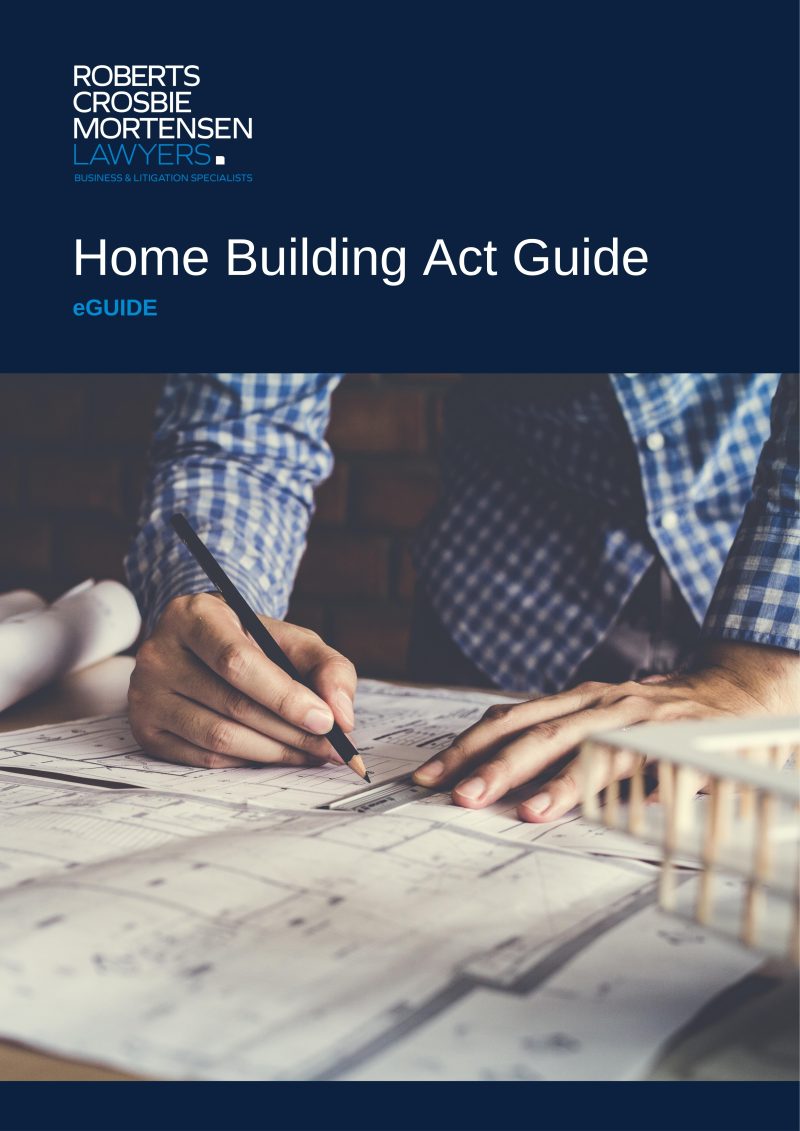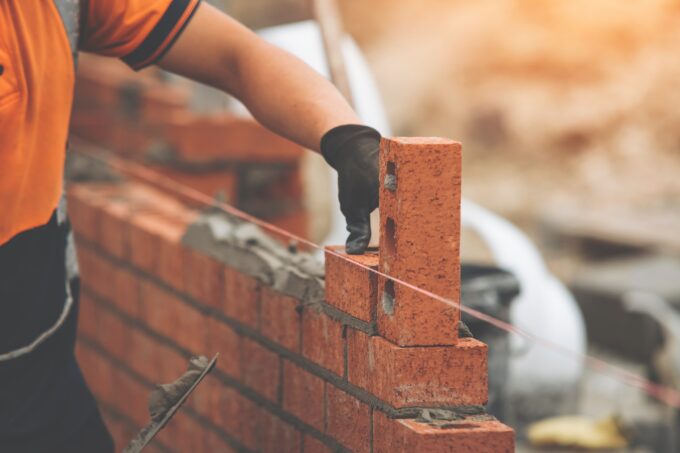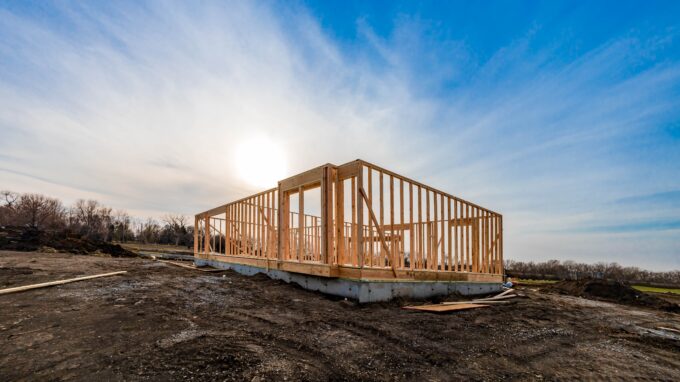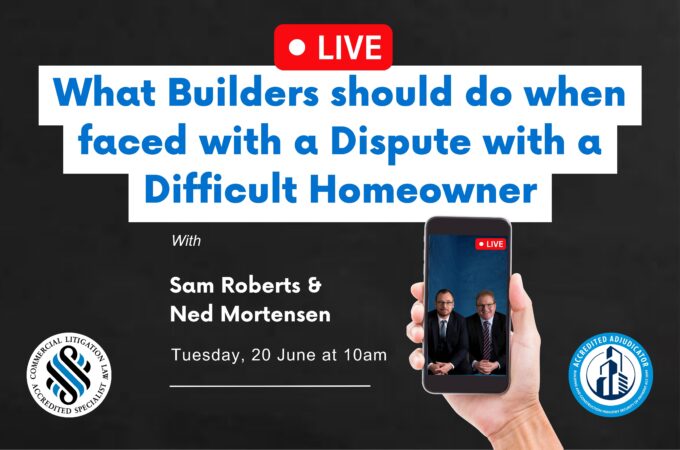In this article our resident expert Home Building Lawyer and Accredited Adjudicator of Security of Payment claims, Ned Mortensen; comprehensively answers this frequently asked, and often complex, question; addressing home owners’ common misconceptions in relation to the right to terminate for delays; and explains:
My Home Builder is “running late”. When can I terminate my residential building contract and get another builder to complete the work?
My Home Builder is “running late”. When can I terminate my residential building contract and get another builder to complete the work?

- Building Periods and Dates for Practical Completion in common residential building contracts,
- How to determine when the Building Period commences,
- Adjustments to the Building Period and when they need to be approved by the homeowner,
- Some contract law basics to help owners understand how different terms of a contract operate,
- Liquidated damages clauses and common law delay damages at large,
- When a right of termination for repudiation might exist in relation to an absent builder, as opposed to a slow but steady builder,
- The hard lessons for homeowners purporting to terminate for repudiation extracted from the Appeal Panel decision in Patel v Redmyre Group Limited [2021] NSWCATAP 132.
Need Answers Fast? Contact Us Today
The General Contractual Position on “running late” in HIA, MBA and Fair Trading Contracts
Most residential building contracts used by home builders are the standard form of contracts published by the Housing Industry Association, the Master Builders Association, or the Department of Fair Trading (together, the Standard Form Contracts).
Helpfully, these Standard Form Contracts all deal with contractual terms stipulating the period of time for a builder to complete their works in a similar way.
The Building Period
Each of the Standard Form Contracts has a Building Period specified, usually by an item within the Schedules.
At the time of writing, the Building Period can be found in the HIA contract at item 6 of Schedule1 and in the MBA Contract it’s item 5(b) of schedule 2. Fair Trading’s Contract has the period within the body of the Contract at Clause 6.
When Does the Building Period Start?
The Building Period does not automatically start once the Contract is signed by the parties.
Each of the Standard Form Contracts have a number of essential preconditions which must be satisfied in order to trigger the start of the Building Period.
These preconditions often include:
- a requirement for the owner to provide proof of their capacity to pay the contract price to the builder,
- production by the owner of evidence of their title to the land on which the house will be built, and
- the obtaining of certain approvals for the works.
It is within the builder’s contractual rights to rely upon an owner’s non-compliance with these preconditions to delay the start of the Building Period.
The Building Period will, therefore, commence when each of the preconditions stipulated in the contract have been satisfied or waived. So, if you’re an owner, be sure to meet these obligations as promptly as you can.



Adjustments to the Building Period (Extensions of Time)
Each of the Standard Form Contracts automatically entitle a builder to a reasonable extension of time if the works are delayed due to:
- inclement weather,
- variations to the works by the owner,
- anything done or not done by the owner,
- delays in getting any approvals,
- delays in the supply of materials selected by the owner,
- the builder suspending work in accordance with the contract,
- a dispute with an adjoining or neighbouring resident or owner, and
- just about anything else you can think of that is out of the builder’s control.
In the case of both the HIA and Fair Trading Contracts, if the builder wishes to claim an extension of time, the builder must notify the owner in writing of the cause and estimated length of the delay within 10 business days of the occurrence of the causing event, or there will be no entitlement for an extension. So, if you’re a builder, be vigilant, diligent, and do not let that opportunity pass.
In the MBA Contract there is no restriction on when an extension can be notified so if you’re an owner, you must take events like inclement weather, variations and even material or trade shortages into account when considering reasonable adjustments to the Building Period.
Do Extensions of Time Have to be Approved by the Owner?
It is a common misconception amongst homeowners that extensions of time have to be approved. They simply do not, they’re automatic or pre-approved when the contract was entered into.
However, notifications of extensions of time by a builder can be disputed by an owner, giving the builder notice in writing setting out reasons for the dispute. The MBA Contract is silent on the owner’s time window for notifying of disputes, the Fair Trading Contract gives the owner 10 business days and the Fair Trading Contract gives five (5).
Common reasons for disputing a notification of an extension of time include:
- That the period of extension is not reasonable having regard to the event causing the delay,
- That the delay was not caused by an event covered by the relevant contract, and
- That the cause of the delay was not beyond the sole control of the builder.
These justifications are frequently not straight forward and care should be taken before denying any claim for an extension of time, particularly where the denial is used to justify a conclusion that a builder is overrunning the Building Period.
Building Works Overrunning the Building Period
Other common misconceptions amongst owners are that; the contract somehow “expires” after the Building Period has ended; or that the builder overrunning the building period is a substantial breach of the contract that gives the owner a right to terminate the contract.
Nothing could be further from the truth, and there are two (2) reasons for this. To explain these reasons, however, it is necessary to explain some very basic contract law.
Some Basic Contract Law
Contracts consist of a collection of “terms”. A term is a description of an obligation of one (1) party to another.
For example, it is a term in each of the Standard Form Contracts that the owner has an obligation to make a progress payment to the builder within five (5) working days of receiving a progress claim. Another example is the term obligating the builder to build the owner’s house in accordance with the agreed drawings and specifications.
All terms, however, are not created equal. Lawyers divide terms into three (3) classes. These are “conditions”, “intermediate terms” and “warranties”.
At a very high level, a condition is a term of a contract so important to a party, that the party would not have entered into the contract if not for its inclusion. A breach of a contract term that is a condition will give the other party a right to terminate the contract.
A warranty is a less important term of a contract that is collateral to the main purpose of the contract and is usually a statement of a required level of performance of a party to a contract.
Typical examples of warranties found in home building contracts are warranties that the work will be done with due care and skill.
A breach of a contract term that is a warranty will not give the other party a right to terminate the contract. A breach of a warranty will only give rise to the right for the non-defaulting party to be paid damages by the defaulting party.
An intermediate term is one with importance laying somewhere between a condition and a warranty. When an intermediate term is breached, it will only entitle a party to terminate if that breach is deemed serious enough to substantially deprive a party of the whole benefit they were intending to obtain by performance.
Whilst sometimes a contract term prescribing a Building Period can be classified as an intermediate term, care needs to be taken if relying upon a breach of that term to terminate. For the vast majority of residential building contracts, the Building Period will not be an intermediate term. For the purposes of our brief residential building contract law discussion, we need not concern ourselves too much with intermediate terms.
So, back to warranties. In each of the Standard Form Contracts, the wording used is that the builder warrants that the work will be done with due diligence and within the time stipulated in the contract, or if no time is stipulated, within a reasonable time.
As explained above, a party cannot terminate a contract for breach of a warranty. Therefore, the builder’s failure to complete within the time stipulated in the contract is a breach of warranty that does NOT give rise of itself, to the right of an owner to terminate the contract for breach.
In answer to the title question, this is the first reason why owners cannot terminate solely by reason of “late” delivery of the build.

Liquidated Damages
Returning to our brief summary of contract law, you will recall that a party’s breach of a warranty will give the non-defaulting party an entitlement to claim for damages. Both the HIA and MBA Contracts anticipate such a remedy for a breach of the builder’s warranty that the works will be delivered within the building period. That remedy is commonly known as “liquidated damages”.
Liquidated damages is a specified amount of monetary compensation payable for delay damages which is agreed by the parties at the time the contract is entered into. These liquidated damages are payable by the builder to the owner in circumstances where the builder overruns the Building Period adjusted for any extension of time to which the builder is entitled. To be valid and recoverable, liquidated damages must be a genuine estimate of the loss the late delivery of the build will cause to the owner.
If you think a little more deeply about this, a contract that contemplates liquidated damages actually shows that, at the time the parties entered into the contract, they had effectively agreed in advance that the build might run for longer than the Building Period and what would happen if it did run late. That is, that if the build ran late, the remedy would be that damages would be payable, and not that the owner could terminate.
This is the second reason why an owner cannot usually terminate for a breach of a term stipulating work to be performed within the Building Period.
Need Answers Fast? Contact Us Today
The Slow but Steady Builder
So far, we have only thought about situations where the builder is building more slowly than the owner would like. We might call this builder “the slow builder”.
He comes to site more often than not, puts in a decent day’s work when he is actually there, and is progressing the build.
Yes, he’s “running late” when viewed in the context of the contractual Building Period but he is still there and will finish a little late but within a reasonable time, albeit that he may be liable to the owner for damages for late delivery.
But what about the situation where a builder turns up to site less often than not, and does not even seem to care whether the works are progressing or not? That’s an entirely different scenario which may actually give an owner the right to terminate.
The Builder Not Building (Repudiatory Conduct)
Distinguishable from the slow builder is the builder not building or the absent builder.
He is probably absent from site more often than not, and does not even seem to care whether the work is progressing or not.
This builder is likely to be “repudiating” the contract.
The expression “repudiation” is used in several different senses. Here, we are using “repudiation” to refer to:
- conduct which evinces an unwillingness or an inability to render substantial performance of the contract, or
- conduct of a party which evinces an intention no longer to be bound by the contract or to fulfil it only in a manner substantially inconsistent with the party’s obligations.
In this situation an owner can lawfully terminate for repudiation. However, homeowners need to be very cautious about deciding that their builder is such a builder and should not do so without first obtaining legal advice.
This is because an owner who incorrectly asserts that a builder has repudiated a contract and terminates on that basis, will themselves be repudiating the contract. The owner therefore will be liable to be sued by the builder for his lost profit on the unclaimed portion of the contract value at the time of the owner’s unlawful termination, in the event that the builder elects to terminate for the homeowner’s repudiation.
To Summarise
The right of an owner to terminate for delay is generally not founded in the builder’s lack of speed, nor is it founded in the builder having missed contractual milestones. Instead, any right to terminate is founded on the builder’s lack of due diligence in progressing the works. A lack of due diligence that can evince repudiatory conduct.
But where is the magic line between the slow builder and the builder without diligence?
The NSW Court of Appeal has described the benchmark for lack of diligence as an elusive concept that has avoided judicial clarity for generations.
There are, however, a few cases that shed light on the proper tests for lack of due diligence and the Appeal Panel of the NSW Civil & Administrative Tribunal has in recent years been consolidating these judgments to formulate a determination as to whether an owner has the right to terminate for their builder not diligently progressing the works.
Steps to Building a Case for Repudiation
The starting point is clear. In any contested Court or Tribunal proceedings, it will be up to the owner to establish a lack of due diligence, and a failure to do so at a final hearing can end up with a builder successfully suing the owner for any unpaid progress claims and his lost profit.
The next point is also clear. The contractual Building Period is not relevant to any assessment of whether a builder is progressing the work with due diligence.
What is relevant is what a reasonable time period would be for a diligent builder to complete the works. In most cases, this will require an owner to adduce expert evidence from an independent building consultant as to what a reasonable time for their particular build is.
An Owner’s Hard Lesson
The case of Patel v Redmyre Group Limited [2021] NSWCATAP 132, which was heard by the Appeal Panel of the NSW Civil and Administrative Tribunal, concerned, amongst other things, an appeal by an owner against an NCAT decision that an owner had unlawfully terminated their builder for delay, in circumstances where the contractual date for completion had come and gone, and the builder had only finished about half of the works under contract at the date of the owners’ termination.
The owners were not successful in the initial hearing because, amongst other reasons, they had failed to prove that their builder lacked due diligence, and, therefore, that they had the right to lawfully terminate for what was a very late delivery.
The owners were also unsuccessful in the appeal.
Relevantly, the Appeal Panel observed that:
- It is not sufficient for an owner to hold the firm belief that the builder has inappropriately delayed the completion of the building works and had therefore proceeded without due diligence. Rather, it is necessary for an owner to adduce appropriate evidence concerning the period during which a builder carrying out the work competently should have performed the work under contract.
- Additionally, the owners should also show evidence that there were no circumstances preventing the builder from having performed the works at a more rapid rate.
The owner’s inability or failure to demonstrate either in the case was their downfall.
When Contract Termination is Valid
Only when the above two (2) matters can be satisfactorily proved should an owner take the sometimes risky step of terminating for delay.
Get this process wrong, and you can lose rights that you thought you had under the contract for compensation or worse; become liable to your builder for his lost profit.
Building and Construction Lawyers for Sydney and Newcastle
Need Answers Fast? Contact Us Today
The information in this article is not legal advice and is intended to provide commentary and general information only. It should not be relied upon or used as a definitive or complete statement of the relevant law. You should obtain formal legal advice specific to your particular circumstance. Liability limited by a scheme approved under Professional Standards Legislation.























